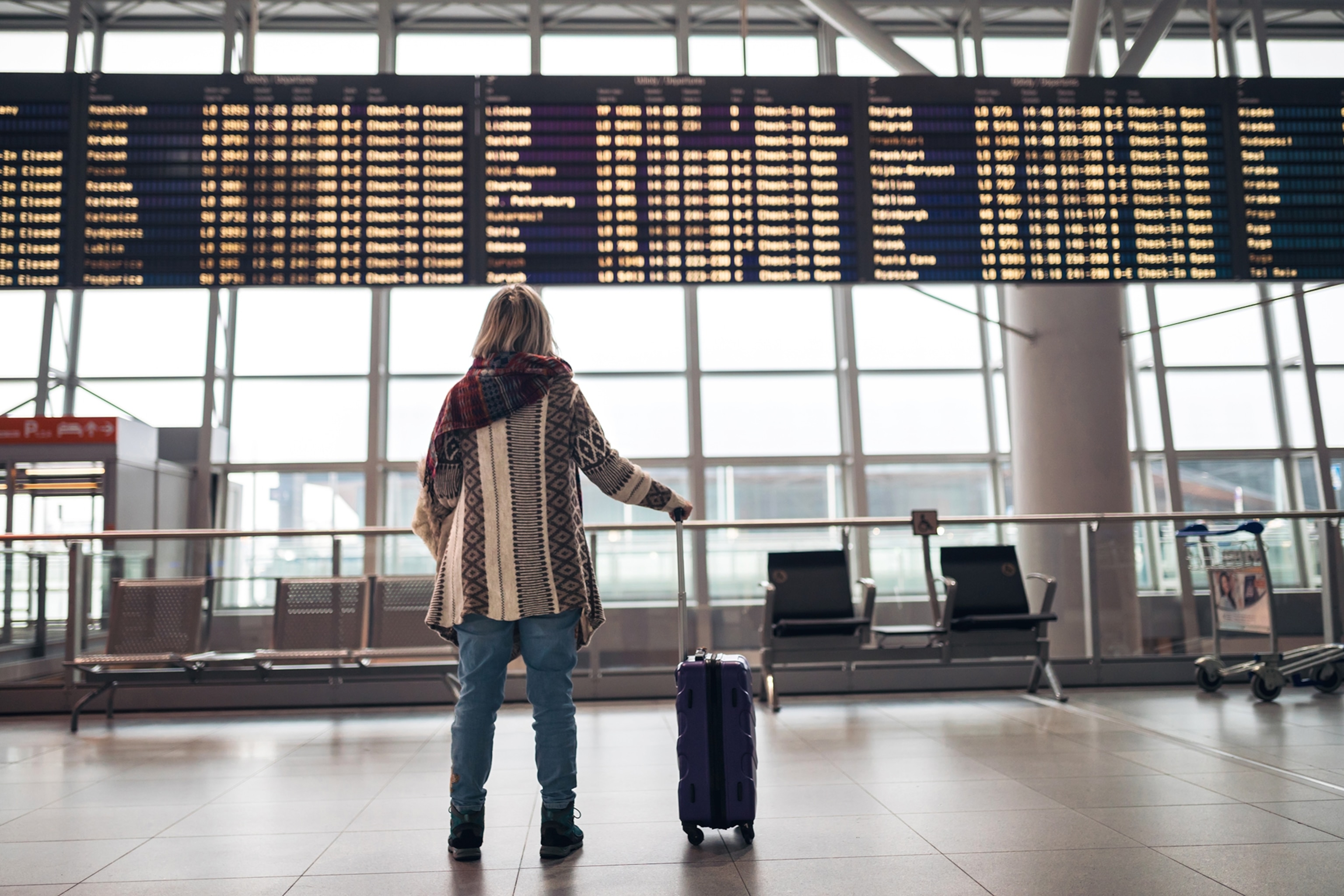
Travelling in the UK and your flight’s cancelled? Here's what to do
From the rules on compensation to the airlines' obligations, here’s the latest on what you should do if facing air travel disruption to or from the UK.
It’s a situation many are familiar with: getting to the airport only to be greeted with a sea of red on the departure board. Delays and cancellations are something every traveller will eventually be faced with, but navigating the murky world of consumer rights and compensation can add a whole extra hurdle. Here’s everything you need to know if your plans are impacted by air travel disruption.
My flight is delayed. Can I get compensation?
Whether you’re owed anything will come down to a variety of factors, the most important of which is whether the issue is the fault of the airline — if it’s not, you can’t expect any compensation.
This rules out air traffic control issues, bad weather, strikes (not by airline staff) and situations deemed ‘extraordinary’. However, you can expect recompense for issues caused by airline staffing, technical problems and general late running.
How much you’re owed depends on the length of your flight, but airlines are duty-bound by UK and European law — namely EU261 (also UK261, post Brexit) — to pay out if you reach your destination more than three hours late, in most cases.
The law states:
- For a short-haul flight of under 1,500km (932 miles) — £220
- For a medium-haul flight of 1,501km-3,500km (932.7 miles-2,174 miles) — £350
- For a long-haul flight of more than 3,500km (2,174 miles) but with a delay of less than four hours — £260
- For a long-haul flight of more than 3,500km (2,174 miles) and a delay of more than four hours — £520
It’s important to check which category your flight falls into, so you know how much to expect, and to get in touch with your airline.
Who do the rules apply to?
The law applies to anyone departing from an airport in the UK on any airline. Similarly, it applies to passengers arriving at an airport in the UK or EU on an airline registered in either jurisdiction. In all other cases, you must rely on travel insurance to cover losses, so it’s important to take this out ahead of a trip.
What if I’m delayed at the airport?
Under the law, airlines must provide you with care and assistance while you wait if your flight is significantly delayed. How long the delay has to be depends on the distance of the flight:
- For a short-haul flight under 1,500km (932 miles) — two hours
- For a medium-haul flight of 1,501km-3,500km (932.7 miles-2174 miles) — three hours
- For a long-haul flight of over 3,500km (2,174 miles) — four hours
After such time, airlines must provide: a reasonable amount of food and drink (often given in the form of vouchers to be used at the airport); accommodation, if you’re rerouted the next day; and transport to and from the accommodation (or your home, if you’re able to return there).
How does all of this work in principle?
In theory you should be automatically provided with vouchers for food and, if required, booked into a hotel by the airline. But this doesn’t always happen.
You should make every effort to contact the airline for help, but if you find it impossible to get through, you can book it all yourself. For example, you can book a nearby hotel, get a taxi to it and expect your money to be reimbursed. But you must keep receipts for every element, as you’ll need them for claiming these expenses back.
Finally, be reasonable in what you book. A suite at a five-star hotel will likely be contested by your airline, while a claim for a standard double at an airport hotel should sail through, even if it’s expensive because demand is high.
(Related: What to do if your flight is delayed or cancelled in the U.S.)
What if my flight is cancelled?
Under the same law, the airline must offer you the choice of a refund, re-routing or re-booking — including with other carriers — or the opportunity to move your departure date.
Carriers are getting better at booking passengers onto rival airlines that fly the same route, but travellers should always be ready to remind them of their obligations under EU261.
What about compensation for cancellations?
If your flight is cancelled with fewer than 14 days’ notice, you may be due compensation of up to £520.
The criteria vary depending on when your new flight departs and arrives in relation to the original booking. Citizens Advice has a useful table that will prove useful if your flight is cancelled.
What if my airline refuses to pay?
Arguing a cancellation is ‘extraordinary’ is one tactic airlines use to try and avoid paying compensation. However, it’s worth fighting if you believe you’re being hoodwinked. Anna Bowles, the head of consumer policy and enforcement at the Civil Aviation Authority, said customers should first complain to their airline if they believe they’re being treated unfairly.
She added: “If they’re not satisfied with the response, consumers can seek redress via the approved Alternative Dispute Resolution (ADR) service. Where an airline is not signed up to the ADR service, passengers can escalate their complaint to the UK Civil Aviation Authority’s passenger advice and complaints team.”
To subscribe to National Geographic Traveller (UK) magazine click here. (Available in select countries only).